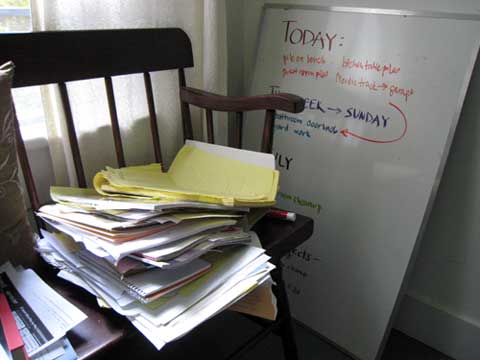It’s one o’clock when we reach the house. Neither Mom nor I have eaten all day. She took her meds sometime before I picked her up at nine; I ate half a bag of peanut M&Ms on the drive to Salem. When we walk into the kitchen, she sets her purse down and says, “I’m hungry.”
“What would you like to eat?” I ask.
“Peanut butter,” she says.
“Just peanut butter?” I ask.
“And bread,” she says.
“A peanut butter sandwich?” I ask.
She thinks about it. “Yes,” she says. She shuffles her feet and looks down.
“Would you like me to make the sandwich?” I ask, pulling the bread and peanut butter from the fridge.
“No,” she says. “I can make it.” I watch as she slathers the bread with thick gobs of peanut butter. “And milk,” she says. I pour her a glass of milk.
While she works, I prepare a place for her at the kitchen table. “Why don’t you sit down,” I say.
“I’m fine,” she says. She stands at the counter and devours the sandwich in great gulps. She chases it with the milk.
When she’s finished, I show Mom the computer at the kitchen table. She sits down and types in a URL. She clicks the button. She clicks the button. She clicks the button. “It’s not working,” she says. I look. She’s not actually clicking the button.
“You’re pressing the space bar,” I say. “You need to click the button.” She presses the space bar again. And again. She looks at me, and I know that I’m making her uncomfortable, so I leave.
Moments later, she’s up again. I can see her pacing. She’s pacing, as if she can’t make up her mind where to go or what to do. I hear her walk into the next room and begin rummaging on the bookshelf. She comes in to my room. “You said I could borrow books,” she says.
“Yes,” I say. “What would you like to read?”
“How long will I be gone?” she asks.
“I don’t know,” I say. “A few days.”
“It doesn’t matter,” she says. “Anything.”
I giver her My Antonia by Willa Cather, A Tree Grows in Brooklyn by Betty Smith, and a couple of others. She sits down at the kitchen table again, in front of the computer. She opens her e-mail program. I go back to my chair.
Moments later, she’s up again, pacing. “I don’t like it here,” she says. “Can’t we just go someplace and drive around?”
“Yes,” I say. “I have to go upstairs for a minute first.”
“Is the car unlocked?” she asks.
“Yes,” I say. I go up upstairs to send e-mail so the family knows where we are. When I get in the car, Mom is sitting at attention in the passenger seat. She has everything with her: her purse, the pile of books. I start driving.
Tony and Kamie pass us going the other way. They turn their truck around to follow. Tony calls me on my cell phone. “We’re behind you,” he says.
“I’m scared,” Mom says. Her hands are fidgeting uncontrollably. She’s sweating.
“Yes,” I say. “I am too. But it will be okay. It will be fine.” We drive in silence for a few minutes. Mom fidgets.
“Can we go to the hospital now?” she asks at last.
“Yes,” I say. “We’re almost there.”


